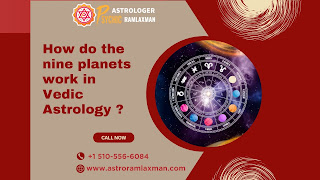How do the nine planets work in Vedic Astrology ?
Introduction:
Vedic Astrology, also known as Jyotish, is an ancient Indian system of astrology that has been used for thousands of years to predict events and understand the energies of the universe. In Vedic Astrology, the nine planets, or Navagrahas, play a significant role in understanding a person's horoscope and life events. Each planet has a specific energy associated with it, and its placement in a particular house in the horoscope can influence a person's life in various ways. Here's how the nine planets work in Vedic Astrology:
Sun (Surya):
The Sun is considered the king of all the planets and represents the soul, spirit, and vitality. It is associated with the zodiac sign Leo and is responsible for one's health, wealth, and career. A strong Sun in one's horoscope indicates leadership qualities, confidence, and success in life.
Moon (Chandra):
The Moon is associated with the zodiac sign Cancer and represents the mind, emotions, and motherly love. It is responsible for one's mental health, happiness, and prosperity. A strong Moon in one's horoscope indicates emotional stability, creativity, and intuition.
Mars (Mangal):
Mars represents courage, strength, and energy. It is associated with the zodiac signs Aries and Scorpio and is responsible for one's physical strength, passion, and determination. A strong Mars in one's horoscope indicates leadership qualities, success in sports, and a strong willpower.
Mercury (Budha):
Mercury represents communication, intelligence, and logical thinking. It is associated with the zodiac signs Gemini and Virgo and is responsible for one's mental abilities, education, and business acumen. A strong Mercury in one's horoscope indicates a sharp intellect, excellent communication skills, and success in business.
Jupiter (Guru):
Jupiter is known as the planet of wisdom and represents knowledge, spirituality, and good fortune. It is associated with the zodiac signs Sagittarius and Pisces and is responsible for one's education, wealth, and happiness. A strong Jupiter in one's horoscope indicates wisdom, spirituality, and good fortune.
Venus (Shukra):
Venus represents beauty, love, and relationships. It is associated with the zodiac signs Taurus and Libra and is responsible for one's romantic life, artistic abilities, and material comforts. A strong Venus in one's horoscope indicates a love for beauty, a passion for the arts, and a successful romantic life.
Saturn (Shani):
Saturn is known as the planet of karma and represents discipline, hard work, and responsibility. It is associated with the zodiac signs Capricorn and Aquarius and is responsible for one's career, financial stability, and life lessons. A strong Saturn in one's horoscope indicates discipline, hard work, and success in one's career.
Rahu:
Rahu is a shadow planet and represents desire, obsession, and materialism. It is associated with the zodiac sign Scorpio and is responsible for one's material gains, ambition, and worldly desires. A strong Rahu in one's horoscope indicates a strong desire for material success and fame.
Ketu:
Ketu is another shadow planet and represents spirituality, detachment, and liberation. It is associated with the zodiac sign Pisces and is responsible for one's spiritual growth, enlightenment, and detachment from worldly desires. A strong Ketu in one's horoscope indicates a desire for spiritual growth and detachment from material desires.
Conclusion:
The nine planets in Vedic Astrology play a significant role in understanding a person's horoscope and life events. Each planet has a specific energy associated with it, and its placement in a particular house in the horoscope can influence a person's life in various ways. By understanding the energies of the planets, one can gain insight into their life purpose, strengths, weaknesses, and potential for success and happiness.



.jpg)
Comments
Post a Comment